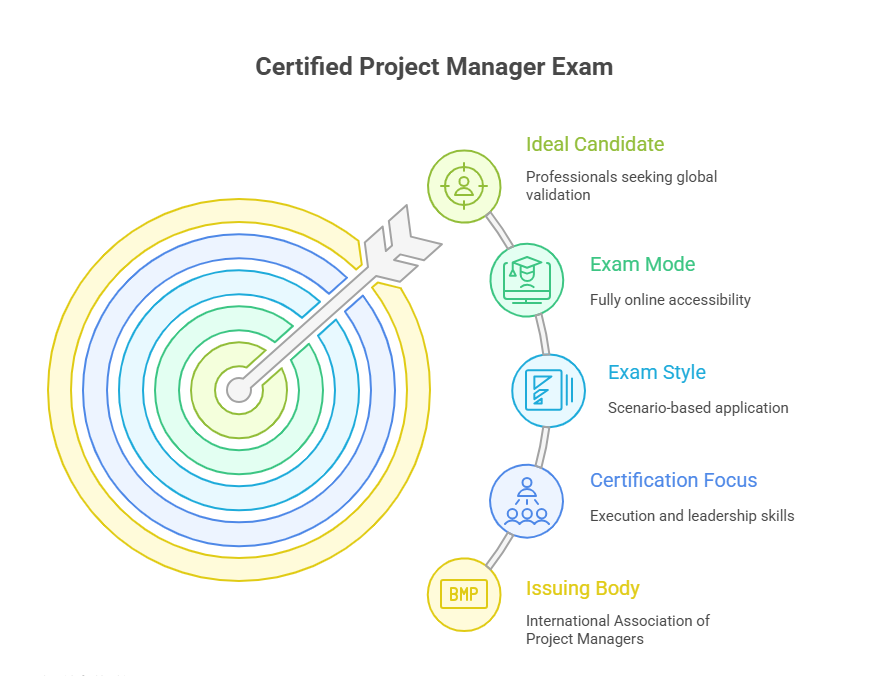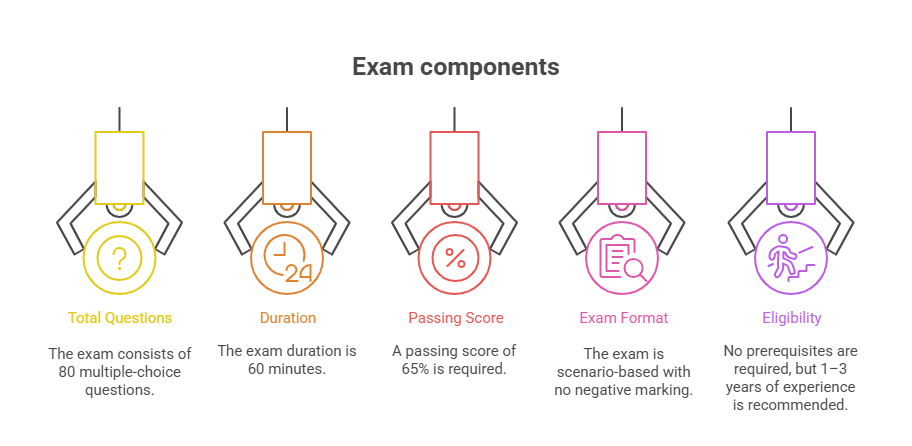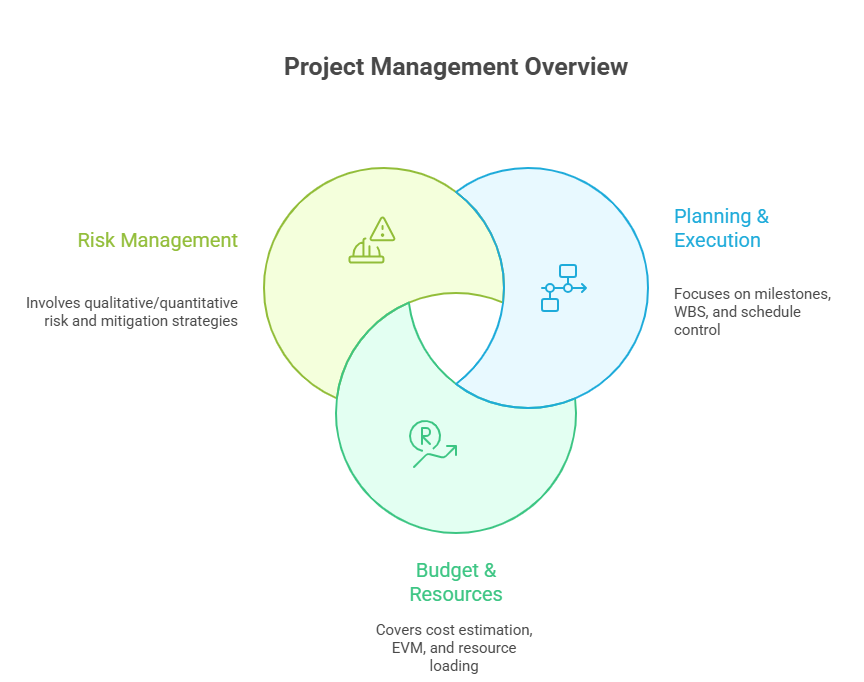Mastering the Certified Project Manager (IAPM) Exam: Expert Insights
The Certified Project Manager (IAPM) exam is one of the most targeted credentials for professionals aiming to validate their project leadership skills without the bureaucracy of traditional certifications. Unlike PMI or PRINCE2 exams that often overwhelm with documentation-heavy processes, IAPM streamlines its focus on practical project execution and efficiency—making it especially appealing for fast-moving industries and agile environments.
Whether you're transitioning from a technical role or looking to formalize years of project experience, this exam gives you a recognized global credential that speaks to your capability. This guide delivers high-intent insights to help you prepare smarter—not longer—and pass the exam with confidence. Every section is designed to strip away fluff and focus on the decision-making, preparation strategies, and exam structure that actually affect your result.
What is the Certified Project Manager (IAPM) Exam?
The Certified Project Manager (IAPM) exam is offered by the International Association of Project Managers (IAPM), a globally recognized body focused on practical, accessible project management standards. This certification targets professionals who need a streamlined, application-focused credential without jumping through bureaucratic hoops.
Unlike many certifications, IAPM doesn’t require candidates to log hours or submit project portfolios. Instead, it emphasizes your ability to apply PM principles in real-world contexts—leaning into execution, team leadership, and project delivery. It's designed for both corporate environments and freelancers managing client-based work.
The IAPM framework is built around international project management standards, covering planning, resource coordination, stakeholder communication, risk, and quality management. However, its real differentiator lies in how practical and testable the content is—with a focus on clarity, not confusion.
Another advantage: there are no mandatory classroom hours or hidden costs. Candidates can prepare independently, using official IAPM materials or external resources. Once ready, the exam can be taken entirely online, making it one of the most flexible yet respected project management certifications globally.
If you're looking for a lean, globally recognized, and application-oriented certification, the IAPM exam delivers exactly that—without the red tape.
Exam Structure and Requirements
The Certified Project Manager (IAPM) exam is intentionally designed to test real-world competence—not memorization. It's 100% online, with global accessibility and no geographic restrictions. Candidates can schedule the exam after registration and pay the exam fee directly—no audit, no application backlog.
Exam Format
The exam consists of 80 multiple-choice questions, all based on IAPM’s official project management guidelines. You’ll have 60 minutes to complete it. Questions are randomized and cover both theory and application, simulating real project decisions—expect more scenario analysis than definition recall.
There’s no negative marking. However, you must score at least 65% to pass. Your result is available immediately after completion. If passed, you're awarded the certification instantly—valid for life, with no renewals or annual fees.
Eligibility Criteria
There are no mandatory prerequisites—this is part of what makes the IAPM route accessible. However, it is recommended that candidates:
Have 1–3 years of project experience
Study the official IAPM guidebook thoroughly
Take the free self-assessment quiz to gauge readiness
IAPM certifications are ideal for those seeking a clean, no-friction path to project validation, especially in startup or agile-heavy environments.
Core Topics Covered in the Exam
The Certified Project Manager (IAPM) exam focuses on the applied understanding of core project management disciplines. It doesn’t test academic theory—it tests whether you can lead projects that deliver results. Each topic maps to real-world functions and challenges you’ll face as a practicing project manager.
Project Planning and Execution
You’re expected to understand how to:
Define clear, actionable objectives based on client or stakeholder needs
Break down projects into work packages, milestones, and deliverables
Sequence tasks logically while managing constraints
Adapt project baselines in response to shifting priorities
The exam tests your ability to apply structured planning principles while staying flexible in execution. You’ll often face situational questions asking how to proceed when scope, schedule, or resources shift mid-project.
Budgeting and Resource Management
Expect questions around:
Calculating resource availability and load
Budget estimation using bottom-up and analogous methods
Monitoring costs with earned value management (EVM) and variance analysis
Making trade-offs when budget conflicts with scope or quality
Budgeting isn’t tested in isolation. You’ll be expected to make decisions that reflect the financial reality of running a project under pressure.
Risk Management
This section focuses on:
Identifying and classifying risks by probability and impact
Prioritizing response strategies: avoid, mitigate, transfer, or accept
Communicating risk exposure to stakeholders without delay
Developing risk registers and response plans
The IAPM exam tests whether you can anticipate and act—not just react. It rewards candidates who can balance risk logic with delivery pressure, and who communicate transparently when issues arise.
Effective Study Strategies for the IAPM Exam
Passing the Certified Project Manager (IAPM) exam requires strategic preparation, not passive reading. Since the exam is scenario-heavy, your study approach must go beyond memorization and instead focus on decision-making in real-world project settings.
Creating a Study Schedule
Treat your exam like a project. Break down your study into:
Week 1: Core concepts—project lifecycle, roles, documentation
Week 2: Planning and execution—scheduling, WBS, milestones
Week 3: Cost and risk—budgeting, reserves, EVM, mitigation
Week 4: Mock exams and review of weak areas
Study for 90 minutes daily in focused blocks. Use timeboxing, not multitasking. Consistency beats intensity.
Utilizing Practice Questions
Practice is essential—not just to memorize, but to train your brain to interpret IAPM-style questions. Use:
Official IAPM sample tests
Flashcards for key terms and formulas
Scenario-based quizzes focused on application
After each mock exam, review not just wrong answers—but right ones too. Ask: “Why is this correct under pressure?” Repetition won’t help if your logic is flawed.
Supplement with peer groups or forums. Discuss real case studies and explain your reasoning aloud. You’re not just preparing to pass a test—you’re training to lead under constraints.
| Strategy Area | Key Actions |
|---|---|
| Study Plan | Create a 4-week schedule focusing on weekly topic clusters for better retention |
| Practice Questions | Use official IAPM mocks and third-party tests; simulate real exam timing |
| Review Process | Analyze errors, tag weak topics, and build rules for faster scenario recognition |
Career Advancement with IAPM Certification
The Certified Project Manager (IAPM) certification isn't about checking a box—it’s about unlocking roles where you’re trusted to lead, not just manage. It signals to employers that you can plan, execute, and deliver results without micromanagement or dependency on rigid frameworks.
Roles You Can Access
After IAPM certification, candidates often qualify for:
Project Manager or Project Lead roles in mid-size firms
Client-facing roles in agencies or consultancies
Technical Project Coordinator or Scrum Lead in product teams
In many organizations, IAPM is viewed as a strong substitute for PMP when hiring for roles that demand execution speed and communication skills over bureaucracy.
Sectors That Recognize IAPM
IAPM is particularly valued in:
Tech startups and SaaS companies
Creative and marketing agencies
IT services and implementation teams
Freelance and contract-based consulting
These environments value agile thinkers and lean project managers, not certification collectors.
Career ROI
You won’t need to renew IAPM annually or maintain PDUs. That makes it a low-cost, high-return credential for professionals seeking quick progression. Whether you’re aiming for better contracts, internal promotions, or global remote roles—IAPM puts you in the conversation.
| Role Examples | Where IAPM Applies |
|---|---|
| Project Manager | Tech companies, SaaS startups, cross-functional delivery teams |
| Agile Lead | Software development firms, remote product teams, digital platforms |
| Client Delivery Manager | Marketing agencies, consulting firms, international client projects |
How APMIC’s Project Management Certification Prepares You for the IAPM Exam
If you’ve already completed the Project Management Certification by APMIC, you’re not starting from zero—you’re entering the IAPM exam with strategic leverage. APMIC’s training focuses heavily on applied knowledge, which is exactly what IAPM assesses.
APMIC teaches:
Scope and time management using practical planning techniques
Cost control with earned value principles
Risk prioritization using qualitative and quantitative methods
Real-world stakeholder communication and team leadership
These aren’t abstract theories—they’re the exact concepts IAPM tests in scenario-based formats.
More importantly, APMIC emphasizes decision-making under constraint, not just textbook memorization. That mindset is critical when answering IAPM’s case-driven questions where you’ll choose between good and better—not right and wrong.
If you’ve studied under APMIC’s applied framework, the IAPM exam becomes less about preparation—and more about demonstrating what you already know.
Frequently Asked Questions
-
The Certified Project Manager (IAPM) certification is a globally recognized credential awarded by the International Association of Project Managers. It’s ideal for professionals who want to validate their project management skills without the bureaucracy of traditional certifications like PMP. The IAPM exam focuses on practical application rather than theory-heavy content, making it suitable for freelancers, startup managers, team leads, and mid-level project professionals. If you already have foundational training such as the Project Management Certification by APMIC, IAPM offers the next step—testing your ability to apply knowledge in real-world project environments. It’s a lifetime certification, meaning no renewals or ongoing maintenance fees.
-
The IAPM certification is leaner and more accessible than PMP or PRINCE2. PMP demands documented hours, formal applications, and ongoing renewal, while PRINCE2 focuses heavily on process governance and documentation. IAPM, by contrast, emphasizes execution, leadership, and adaptability, testing you on scenario-based decisions rather than compliance with rigid frameworks. It’s also fully online, self-scheduled, and requires no membership or continuing education fees. While PMP and PRINCE2 may be preferred in highly formal corporate environments, IAPM is often favored in agile, creative, and fast-moving industries where results and leadership matter more than procedural rigor.
-
There are no mandatory prerequisites for the IAPM exam, making it highly accessible. However, IAPM recommends candidates have at least 1–3 years of project management experience to succeed. You should be comfortable with core concepts like project lifecycles, stakeholder management, cost control, scheduling, and risk management. Completing the Project Management Certification by APMIC or a similar training program is highly advantageous, as it ensures you’ve mastered the fundamentals before tackling IAPM’s scenario-based questions. You can register directly through IAPM’s website, choose your exam date, and take the test entirely online.
-
Preparation should focus on scenario-based decision-making rather than memorization. Start by studying IAPM’s official guidebook and recommended reading. Build a 4-week study plan:
Week 1: Project fundamentals—scope, time, quality
Week 2: Planning, execution, stakeholder communication
Week 3: Budget control, risk management, adaptive leadership
Week 4: Practice exams and review of weak areas
Use practice questions to train your ability to eliminate wrong answers and choose the most contextually correct option. If you’ve completed the APMIC Project Management Certification, much of the core knowledge is already covered—focus your prep on applying it under time pressure.
-
The IAPM exam is an online, proctored test with 80 multiple-choice questions to be completed in 60 minutes. The questions are randomized and drawn from IAPM’s official body of knowledge, covering project planning, execution, budgeting, risk, and leadership. A minimum score of 65% is required to pass. There’s no negative marking, and results are available immediately after submission. If you pass, you receive your lifetime-valid certification instantly—no renewal fees or continuing education requirements. The exam’s biggest challenge isn’t difficulty of concepts but speed and decision-making accuracy under time pressure.
-
The Project Management Certification by APMIC is one of the best preparation pathways for IAPM. APMIC’s curriculum covers practical project planning, budgeting, risk prioritization, and stakeholder communication, all of which appear in IAPM’s exam questions. It trains you to apply knowledge in real scenarios, which is the core skill IAPM assesses. Because APMIC emphasizes clarity and adaptability, candidates coming from its program often find IAPM’s content familiar, making preparation smoother and faster. In essence, APMIC equips you with the same decision-making mindset the IAPM exam rewards—turning the test into a confirmation of what you already know.
-
The IAPM certification can help you secure project management roles in industries that prioritize agility and execution over rigid process frameworks. Common positions include Project Manager, Client Delivery Lead, Project Coordinator, and Agile Team Lead. It’s particularly valued in startups, tech, marketing agencies, IT services, and consulting, where flexibility and speed are key. Since the certification is recognized globally, it can also help you compete for remote or international roles. Employers value that IAPM-certified professionals can deliver results without extensive oversight, making it a credential that enhances both employability and earning potential
Conclusion
The Certified Project Manager (IAPM) certification offers a rare mix of accessibility, practicality, and long-term value. It strips away the barriers common in other credentials—no logbooks, no annual fees, no procedural complexity—while still testing your ability to lead real-world projects under pressure.
If you’ve already completed the Project Management Certification by APMIC, you’re not only prepared—you’re advantaged. The frameworks, mindset, and execution style you’ve built are directly aligned with what IAPM assesses: decisive leadership, structured planning, and risk-aware delivery.
Whether you're aiming to break into a new role, win client trust, or scale up to global opportunities, this exam is a strategic move. Prepare smart, apply what you’ve practiced, and walk in knowing you’re built for this.
The badge isn’t the goal—impact is. This is just your proof.




